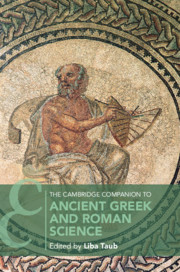63 results
HERO OF ALEXANDRIA AND HIS AFTERLIFE - (C.A.) Roby The Mechanical Tradition of Hero of Alexandria. Strategies of Reading from Antiquity to the Early Modern Period. Pp. viii + 299, b/w & colour ills. Cambridge: Cambridge University Press, 2023. Cased, £85, US$110. ISBN: 978-1-316-51623-2.
-
- Journal:
- The Classical Review / Volume 74 / Issue 2 / October 2024
- Published online by Cambridge University Press:
- 02 October 2024, pp. 435-437
- Print publication:
- October 2024
-
- Article
-
- You have access
- HTML
- Export citation
Contents
-
- Book:
- The Cambridge Companion to Ancient Greek and Roman Science
- Published online:
- 17 January 2020
- Print publication:
- 30 January 2020, pp v-vi
-
- Chapter
- Export citation
Copyright page
-
- Book:
- The Cambridge Companion to Ancient Greek and Roman Science
- Published online:
- 17 January 2020
- Print publication:
- 30 January 2020, pp iv-iv
-
- Chapter
- Export citation
Contributors
-
- Book:
- The Cambridge Companion to Ancient Greek and Roman Science
- Published online:
- 17 January 2020
- Print publication:
- 30 January 2020, pp vii-viii
-
- Chapter
- Export citation
10 - Astronomy in Its Contexts
-
-
- Book:
- The Cambridge Companion to Ancient Greek and Roman Science
- Published online:
- 17 January 2020
- Print publication:
- 30 January 2020, pp 208-228
-
- Chapter
- Export citation
Bibliography
-
- Book:
- The Cambridge Companion to Ancient Greek and Roman Science
- Published online:
- 17 January 2020
- Print publication:
- 30 January 2020, pp 289-318
-
- Chapter
- Export citation
Introduction
-
-
- Book:
- The Cambridge Companion to Ancient Greek and Roman Science
- Published online:
- 17 January 2020
- Print publication:
- 30 January 2020, pp 1-14
-
- Chapter
- Export citation
Index Locorum
-
- Book:
- The Cambridge Companion to Ancient Greek and Roman Science
- Published online:
- 17 January 2020
- Print publication:
- 30 January 2020, pp 318-330
-
- Chapter
- Export citation
General Index
-
- Book:
- The Cambridge Companion to Ancient Greek and Roman Science
- Published online:
- 17 January 2020
- Print publication:
- 30 January 2020, pp 331-344
-
- Chapter
- Export citation
Acknowledgements
-
- Book:
- The Cambridge Companion to Ancient Greek and Roman Science
- Published online:
- 17 January 2020
- Print publication:
- 30 January 2020, pp ix-x
-
- Chapter
- Export citation

The Cambridge Companion to Ancient Greek and Roman Science
-
- Published online:
- 17 January 2020
- Print publication:
- 30 January 2020
Index
-
- Book:
- The Whipple Museum of the History of Science
- Published online:
- 19 August 2019
- Print publication:
- 22 August 2019, pp 323-334
-
- Chapter
-
- You have access
- Open access
- HTML
- Export citation
Appendix: - Student Research Conducted on the Whipple Museum’s Collections since 1995
-
- Book:
- The Whipple Museum of the History of Science
- Published online:
- 19 August 2019
- Print publication:
- 22 August 2019, pp 313-322
-
- Chapter
-
- You have access
- Open access
- HTML
- Export citation
Frontispiece
-
- Book:
- The Whipple Museum of the History of Science
- Published online:
- 19 August 2019
- Print publication:
- 22 August 2019, pp ii-ii
-
- Chapter
-
- You have access
- Open access
- HTML
- Export citation
Copyright page
-
- Book:
- The Whipple Museum of the History of Science
- Published online:
- 19 August 2019
- Print publication:
- 22 August 2019, pp iv-iv
-
- Chapter
-
- You have access
- Open access
- HTML
- Export citation
Acknowledgements
-
- Book:
- The Whipple Museum of the History of Science
- Published online:
- 19 August 2019
- Print publication:
- 22 August 2019, pp xix-xx
-
- Chapter
-
- You have access
- Open access
- HTML
- Export citation
Illustrations
-
- Book:
- The Whipple Museum of the History of Science
- Published online:
- 19 August 2019
- Print publication:
- 22 August 2019, pp vii-xii
-
- Chapter
-
- You have access
- Open access
- HTML
- Export citation
Contributors
-
- Book:
- The Whipple Museum of the History of Science
- Published online:
- 19 August 2019
- Print publication:
- 22 August 2019, pp xiii-xviii
-
- Chapter
-
- You have access
- Open access
- HTML
- Export citation
Introduction
-
-
- Book:
- The Whipple Museum of the History of Science
- Published online:
- 19 August 2019
- Print publication:
- 22 August 2019, pp 1-10
-
- Chapter
-
- You have access
- Open access
- HTML
- Export citation
Contents
-
- Book:
- The Whipple Museum of the History of Science
- Published online:
- 19 August 2019
- Print publication:
- 22 August 2019, pp v-vi
-
- Chapter
-
- You have access
- Open access
- HTML
- Export citation


